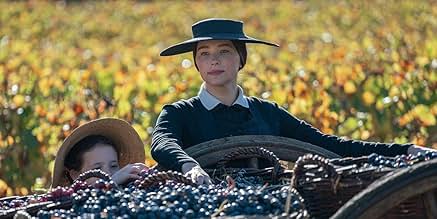According to Wikipedia, Barbe-Nicole married into the Clicquot family, whose holdings included a vineyard and winery. She was widowed at an early age, took over the champagne business, and made it a success using a novel technique that is still in ue today.
According to the dramatic telling in this film, she had a unsympathetic father-in-law, who tried to get her to sell the hectarage she inherited to rival wineries, but she persisted, arguing that her husband lived on in his vines. Despite setbacks that had her sell household goods to pay her workers, her experiments eventually produced a lauded bubbly, at which point her control of the winery was challenged by rivals, who claimed that, by law, she could only do so if she was still a widow (nt remarried), and she was circumventing the law.
Interspersed with the story of his widowhood are flashbacks to scenes of her relationship with her husband, which is a storytelling technique that works for this filmn hinting at a possible caue f his death.
In this version of the story, the winery seems to be seriously underfinanced, one harvest / bottling away from disaster. This would hve happened even if her husband was alive and operating the business. The period costumes do not help, as there are too many men in her lives. Still, it is interesting, even if "the true story of" is a bit of a stretch.






































